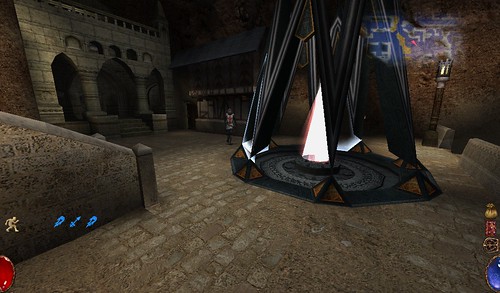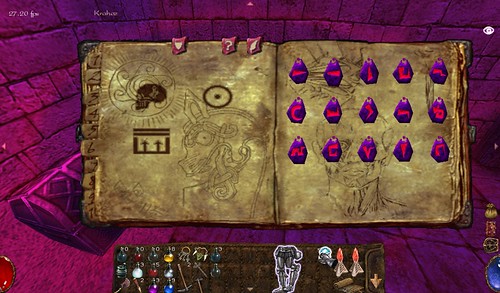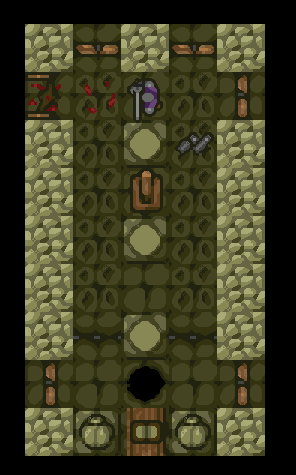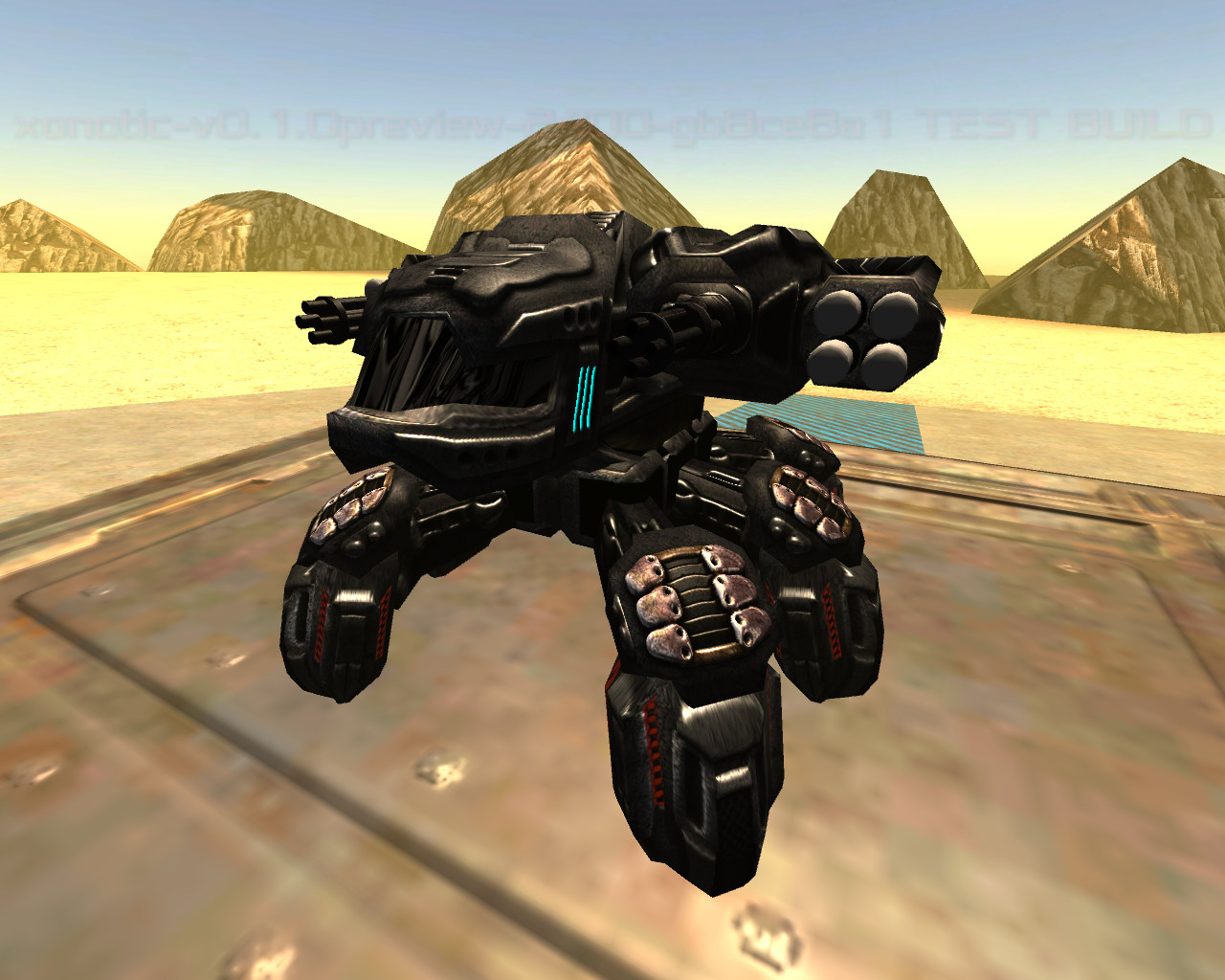Today I'd like to talk about how free culture can be (perhaps counter-intuitively) good for the commercial games business. I'm using Dungeons & Dragons (and its recent and highly successful fork,
Pathfinder) as a concrete example of what I'm talking about, but there's no reason this couldn't also apply to computer games as well.
I've been a Dungeons & Dragons geek for 20 years now, pretty much since I was introduced to it my freshman year of high school. Back in my high school days, D&D was in its second edition and the internet was in its infancy. Dungeons and Dragons was owned by a litigious beast of a company called TSR, which was well known for sending nastygrams every time someone put up a web page with any fan-created D&D content. This was particularly ironic, since the whole idea behind Dungeons & Dragons was that they threw some rule books at you and then told you to create your own content with them.
In the late 1990s, for a variety of reasons (no doubt including its poor treatment of its customers), TSR was in financial trouble and was bought out by Wizards of the Coast. As any follower of a games company knows, it's always a bit scary when another company acquires a company that you like. Usually it turns out to be a bad thing, because the company doing the acquiring is invariably bigger and generally cares less about the actual quality of the product and more about monetizing it (think of all the studios EA has bought up and ruined). In this particular case, our worries were unfounded; the acquisition of TSR by WOTC actually resulted in a huge cultural change for D&D...
Enter the
Open Game License, a share-alike license for table-top roleplaying game content, and the hands down the single best thing ever to happen to Dungeons & Dragons. Shortly after they purchased TSR, Wizards of the Coast released the 3rd edition of D&D under this license, which opened D&D not only to fan expansion but also to commercial development. In fact, after the OGL, the most frequent complaint I heard about D&D is that the popularity OGL-licensed content made the d20 system (which was the underlying system that 3rd edition D&D was built on top of) made it too difficult to compete with. 3rd edition introduced the idea of a
System Reference Document, which was a body of content that was free-as-in-speech and included the basic information necessary to play and the game. Mind you, 3rd Edition had its issues, but it was easy to play, learn, and (most of all) build on top of, which resulted in a massive wealth of content, both commercial and player-created.
Unfortunately, the days of Wizards of the Coast were ultimately shortlived, as they were purchased by the toy and games giant Hasbro in 1999. I have no information from inside the company, but from the outside it would certainly seem that the culture of WOTC changed for the worse shortly thereafter, with
nearly annual layoffs, generally around every Christmas. After Hasbro acquired Wizards, they released Dungeons & Dragons 3.5, which was essentially a more expensive re-release of 3.0 with some balance issues fixed, that ultimately felt like a $100 errata pack. 3.5 was successful as well, but there was no denying the general sense of disappointment gamers felt; it could have been a lot more than it was, and the differences weren't really substantive enough to justify the hefty price tag.
I'm going to digress for a moment and talk about tabletop roleplaying games in general. One thing that seems to happen in the tabletop world is that a new edition of a game will be released, then add-on content will be released for the new edition until eventually the add-ons become so numerous that they're impossible for someone who is GMing the game to keep track of all of them. Eventually, players feel that their needs and wants have been met by the existing content, and no longer feel the need to purchase more; at that point, the games company will go back, examine the limitations of their current system, and create a new one, starting the process anew.
D&D 3.5 had reached this level of saturation when WOTC/Hasbro put out 4th edition. By far (in my opinion) the most distressing change between 3.5 and 4.0 was the gutting of the Open Game Licence and the creation of the
Game System License. 4th edition had its own system reference document, but it was
pathetic (PDF warning) in comparison to the 3rd edition one, and included nothing in the way of useful content. 4th edition also included a number of system changes under the hood, which aren't the subject of this blog post. While I don't want to start a big flamewar about which rule system is better (that's been done to death), it is objectively true that a lot of people who were happy with 3rd edition felt that 4th edition had departed too far from the rules and style of play that they were used to, and continued to play 3.5 as a consequence.
At this point, any good capitalist will tell you that if there's an existing, un-served customer base that wants to be served, then it in your financial best interest to serve them. A company founded in 2002 called Paizo Publishing, which had been successfully releasing add-ons for 3.0/3.5 (among other things) decided to pick up the OGL licensed D&D 3.x content and expand on it, and the Pathfinder system was born. Pathfinder, which like its predecessor, has a complete System Reference Document, which is particularly notable in that it's much more complete than the original 3.x SRD. (As an aside, if you're interested, you can find the official version
here, and a highly usable web version
here. They provide more than enough information to play the complete game, including all the official expansions, for free).
The release of Pathfinder, while based on D&D 3.5, did far more than just address game balance issues -- it also added quite a lot of content that made the game more fun to play in general. As a consequence, Pathfinder has cut into WOTC's revenue, bringing in customers that may have otherwise bought into D&D 4. (As an aside, I feel a lot more disappointed in the 3.5 update to 3.0 now that I know what it
could have been. Seeing how far Paizo took Pathfinder and how much they added makes WOTC/Hasbro's little 3.0->3.5 update feel like even more of a money grab.)
Now that I've established this background information, I'll finally get to my point: if you don't think about it very hard, you may assume that, since the OGL content has clearly lost WOTC/Hasbro money, it's a bad idea commercially. And from their eyes, it probably is. What most people don't consider, though, is that releasing an open system has allowed someone else to step in and turn what would have been a stagnant product line into a commercial success. Any talk from commercial publishers about how free culture is bad for business is utterly uninformed and missing the point of free culture -- what they mean to say is that free culture is bad for companies like them that aren't able to recognize what their customers want.
For companies like Paizo, free culture has created an opportunity for commercial success, and they've managed to monetize their product without removing it from the commons. And, should Paizo ever undergo an unfortunate change of management and decide not to release any more OGL products, another commercial entity could pick up where they left off and continue to make money by giving customers what they want.
The lesson to be learned here is this: the next time you hear someone suggest that free culture is somehow anti-business or bad for the economy, point out to them that it's only bad for stagnant businesses that feel the need to compete by keeping the market closed, rather than releasing content that their customers want. And there's absolutely no reason this can't apply to video games as well.
Peace out,
Bart Kelsey
OpenGameArt.orgP.S. In case you didn't see it above, here is the
complete and unabridged Pathfinder System Reference Document, which contains all of the official Pathfinder content, including add-ons, and is completely playable on its own. If you like it, buy their books. They're excellent. :)
P.P.S Here is a shameless plug for my
Pathfinder blog, with all OGC content. :)

























